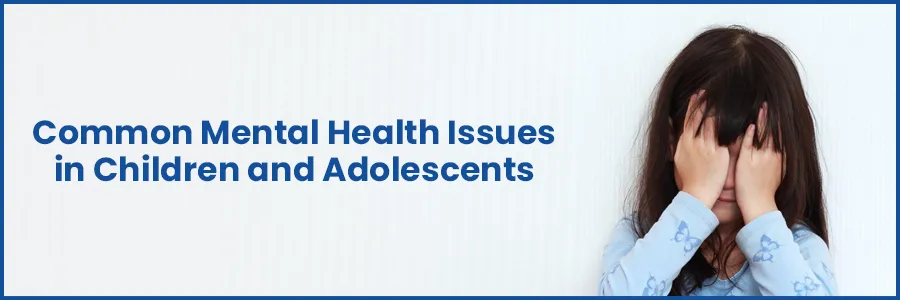- Cardiology 84
- Dermatology 45
- Endocrinology 33
- ENT 16
- Fertility 190
- Gastroenterology 78
- General-Medicine 81
- Gynecology 80
- Hematology 19
- Infectious-Diseases 33
- Neurology 52
- Oncology 34
- Ophthalmology 23
- Orthopedics 69
- Pediatrics 31
- Procedure 23
- Public-Health 144
- Pulmonology 59
- Radiology 8
- Urology 68
- Wellness 161
- Woman-and-child 77

Mental Health Issues in Children and Adolescents
In the intricate journey of childhood and adolescence, nurturing mental health is a cornerstone of holistic development.
The growing recognition of mental health's impact has brought forth a deeper understanding of common health problems adolescents and children often grapple with. Schizophrenia, anxiety, depression, and bipolar disorder are just a few challenges that can surface during these pivotal years.
In this blog, we delve into these prevalent mental health concerns, exploring signs, causes, and interventions that empower the younger generation.
Anxiety Disorders: Taming the Restless Mind
- Anxiety disorders, encompassing generalized anxiety, social anxiety, and specific phobias, can cast a shadow over young minds.
- Excessive worry, fear, and even physical symptoms like a racing heart are telltale signs.
- Addressing anxiety early through open communication and, if needed, professional guidance can set the stage for a more confident journey with mental health issues in children.
Depression: Navigating the Abyss
- Depression's weight doesn't discriminate by age, impacting the psychological problems of adolescents.
- Profound sadness, loss of interest, and shifts in sleep and appetite characterize this condition.
- Recognizing depression's nuances and seeking help can provide a lifeline to brighter days.
Attention-Deficit or Hyperactivity Disorder (ADHD): Channeling Focus
- ADHD disrupts attention, impulse control, and hyperactivity.
- Students with ADHD might struggle to concentrate, follow instructions, and stay still.
- A tailored approach, including therapy and supportive classroom environments, empowers them to harness their potential.
Get a second opinion from trusted experts and makeconfident, informed decisions.
Get Second OpinionEating Disorders: Seeking Balance
- Self-esteem can be negatively impacted by eating disorders like anorexia nervosa and bulimia nervosa.
- Distorted body image and harmful dietary behaviors endanger health and well-being.
- Timely intervention, often involving therapy and nutritional guidance, is pivotal.
Your health is everything - prioritize your well-being today.
Schedule Your AppointmentSelf-Harm, Suicidal Ideation: Navigating Darkness
- Common health problems of adolescents grappling with mental health might resort to self-harm or contemplate suicide.
- Recognizing signs of self-harm, such as unexplained injuries, is crucial.
- Addressing suicidal ideation necessitates immediate attention, highlighting the importance of open dialogue and professional support.
Substance Abuse: Navigating Rough Terrain
- Substance abuse can exacerbate mental health challenges in youth. The allure of experimentation and escapism can lead to long-term struggles.
- A holistic approach, encompassing therapy, family involvement, and community resources, aims to break the cycle.
Conclusion
In the intricate tapestry of youth, mental health threads are delicate yet powerful. Schizophrenia, anxiety, depression, and bipolar disorder are just a few hues that paint this picture. By fostering awareness, destigmatizing conversations, and offering timely support, we nurture resilient futures.
Every intervention, every conversation, and every hand extended can make a world of difference. Let us shape a world where mental health is nurtured, embraced, and prioritized, ensuring that every young heart navigates life's maze with courage and hope.
Frequently Asked Questions
Children and adolescents may experience a variety of mental health issues, including anxiety disorders, depression, attention-deficit/hyperactivity disorder (ADHD), eating disorders, self-harm, suicidal thoughts, and drug addiction.
Signs of anxiety include excessive worry, fear, restlessness, and physical symptoms like a racing heart. Depression might manifest as persistent sadness, loss of interest, changes in sleep or appetite, irritability, and difficulty concentrating.
Attention-Deficit/Hyperactivity Disorder (ADHD) is characterized by attention difficulties, hyperactivity, and impulsivity. Children with ADHD might struggle with focusing, following instructions, and sitting still, which can impact academic and social aspects of their lives.
Two eating disorders that can have negative physical and psychological implications are anorexia nervosa and bulimia nervosa. Distorted body image, extreme dietary behaviors, and preoccupation with weight and appearance are key indicators.
Recognizing signs of self-harm, such as unexplained cuts or bruises, is crucial. For suicidal ideation, open communication is essential. If you notice any warning signs, seek professional help immediately.
Substance abuse can exacerbate existing mental health challenges or even lead to new ones. Experimentation with drugs and alcohol might stem from peer pressure or as a way to cope with emotional distress.
Creating an open and non-judgmental environment for discussions about mental health is vital. Steps to take include promoting healthy coping skills, cultivating good self-esteem, and getting expert assistance when necessary.
Schools play a crucial role in recognizing early signs of mental health issues. Implementing anti-bullying programs, providing access to counseling services, and creating a supportive learning environment can make a positive impact.
While some factors might be beyond our control, promoting open communication, healthy coping skills, and emotional resilience can contribute to better mental well-being in children and adolescents.
Mental health professionals, such as child psychologists, therapists, and school counselors, are trained to provide support and interventions tailored to children and adolescents. Seeking help from a qualified professional is important for proper assessment and treatment.

- Cardiology
- Case Studies
- Dermatology
- Endocrinology
- ENT
- Fertility
- Gastroenterology
- General
- General-Medicine
- Gynecology
- Hematology
- Infectious-Diseases
- Medical News
- Neurology
- Oncology
- Ophthalmology
- Orthopedics
- Pediatrics
- Procedure
- Public-Health
- Pulmonology
- Radiology
- Second Opinion
- Urology
- Wellness
- Woman-and-child